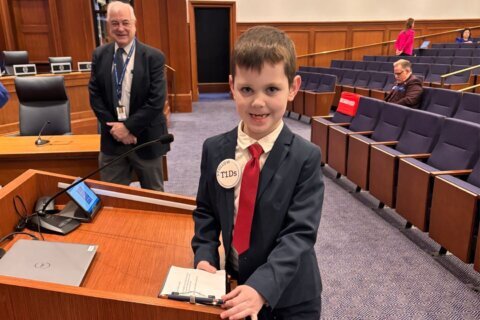This article was republished with permission from WTOP’s news partner InsideNoVa.com. Sign up for InsideNoVa.com’s free email subscription today.
This article was written by WTOP’s news partner InsideNoVa.com and republished with permission. Sign up for InsideNoVa.com’s free email subscription today.
A Virginia Department of Education report released Thursday morning slammed the state of the commonwealth’s public schools, saying expectations, standards and academic performance have all been in decline, while the achievement gap among Virginia’s students has grown.
The report, presented Thursday morning by Virginia Superintendent of Public Instruction Jillian Balow and Secretary of Education Aimee Guidera, also says the state has failed to be transparent about academic failings and calls for an expanded say for parents in public education.
The report blames lagging achievement on a series of factors and policy choices that took place over the last decade and were exacerbated by school closures in 2020 and 2021, state officials said on a call with reporters Thursday morning.
“I think there’s a general culture of just lowering of expectations,” Guidera said. “What happened before today is we took our eye off the ball.”
Among its core takeaways, the report states that state Standards of Learning reading test results fell from 2017 to 2019 for grades three through eight, and that 42% of Virginia’s second graders scored below reading benchmarks on PALS assessment (a metric developed by the University of Virginia that’s used in Virginia elementary schools). The report also points to a growing gap between SOL results and national assessment results from the National Assessment of Educational Progress, calling the difference an “honesty gap.”
“Only 38% of Virginia’s fourth graders and 33% of eighth graders were proficient in reading on the 2019 NAEP, compared to 75% and 76%, respectively, on the 2019 state fourth- and eighth-grade SOL reading tests,” the report says.
Much of Balow’s and Guidera’s presentation Thursday morning hinged on those national assessments as evidence that the state had been presenting a rosier view of student achievement than was justified, something Gov. Glenn Youngkin said repeatedly on the campaign trail last year. But unlike the state SOL exams, which most Virginia students take annually, the NAEP assessments are administered every two years and only a sampling of Virginia students take the exams. In 2017, for example, only 2,300 fourth-graders and 2,200 eighth-graders in Virginia took the national exams. Students and schools selected to take the assessments are supposed to create a statistically significant and randomized sampling.
Guidera and Balow pointed to the deemphasizing of state test scores in school accreditation – the report also notes that VDOE, along with the state Board of Education, will be revising accreditation standards – as well as an increased focus on equity at the state and local level. She said that focus has overlapped with a widening achievement gap between the commonwealth’s White, Black and Hispanic students.
“Often times we’ve been, in the past several years, talking about equity and talking about this need for equity, and I feel personally that that has been a distraction from keeping our eye on the ball from … getting out kids to that finish line of being prepared for life,” Guidera said, referencing former President George W. Bush’s “soft bigotry of lower expectations” quote.
While pointing to wider achievement gaps among a racial breakdown of Virginia’s students, the report fails to make any mention of students with disabilities. Balow said the report was just the start of VDOE’s work to revise academic standards in the state.
“In part, because there just wasn’t time. And in part, because this is just the beginning,” Balow said when asked about the lack of data on students with disabilities.
Youngkin put the commonwealth’s public schools front and center in his run for governor last year, attacking what he said was Critical Race Theory being taught in schools and saying that parents needed a bigger voice in what their children could or could not be taught and what books were a part of their curriculum.
Critical Race Theory itself is an academic concept originally used to examine the way racism has affected the country’s legal system. It has never been a part of the state’s curriculum.
Shortly after taking office, Youngkin launched a tip line email address for parents to report “divisive” concepts – such as CRT – being taught in public schools.
Critics, including a number of school superintendent and teachers groups, said it could create a risky atmosphere for teachers to discuss the country’s history of slavery, Jim Crow and racism. So far, Youngkin’s office has denied a number of Freedom of Information Act Requests for the contents of the email inbox, saying they’re protected from state public records laws as the governor’s personal “working papers and correspondence.” Last month, a number of news outlets filed suit, claiming that the denials violated Virginia’s FOIA laws.
Thursday’s report is a follow-up to an interim report released in February by Balow, which said that VDOE was in the process of rescinding a suite of “policies, programs, and resources that promote discriminatory and divisive concepts” that it said “had become widespread” in the department. With that interim report, Balow said VDOE would be rescinding a number of EdEquity programs. As of Thursday morning, the entirety of VDOE’s EdEquity website had been removed from the website.







